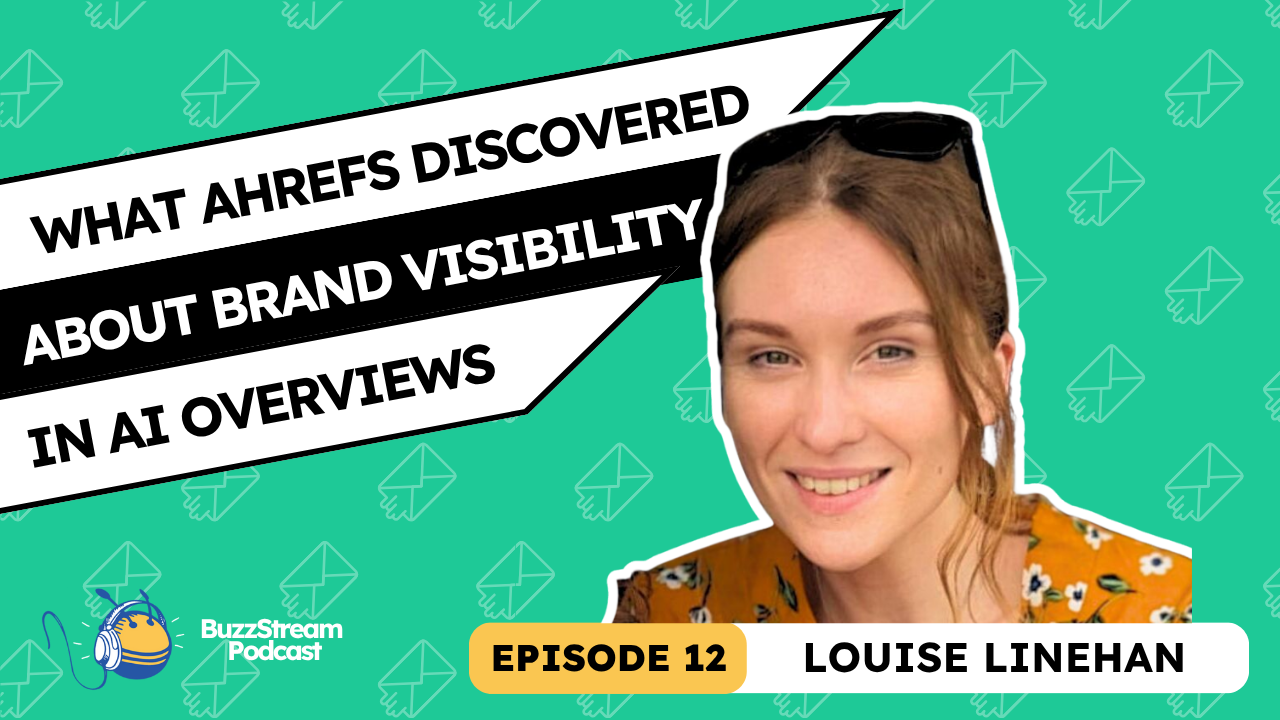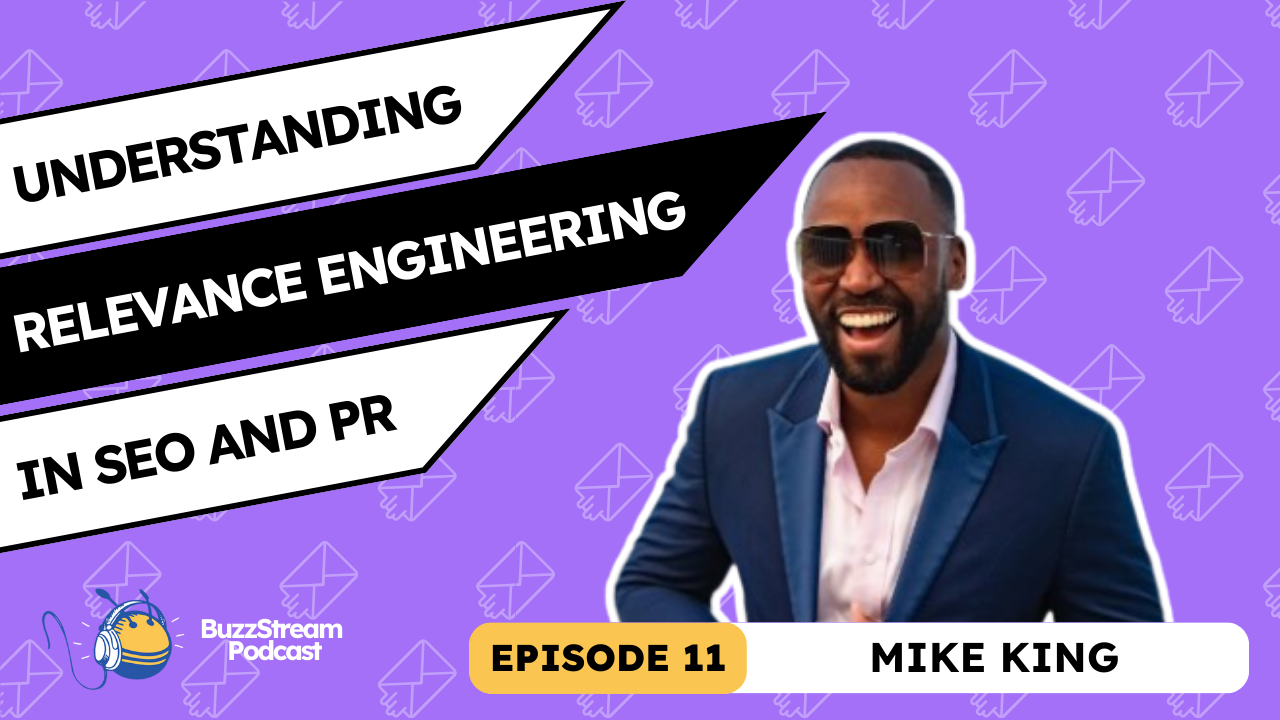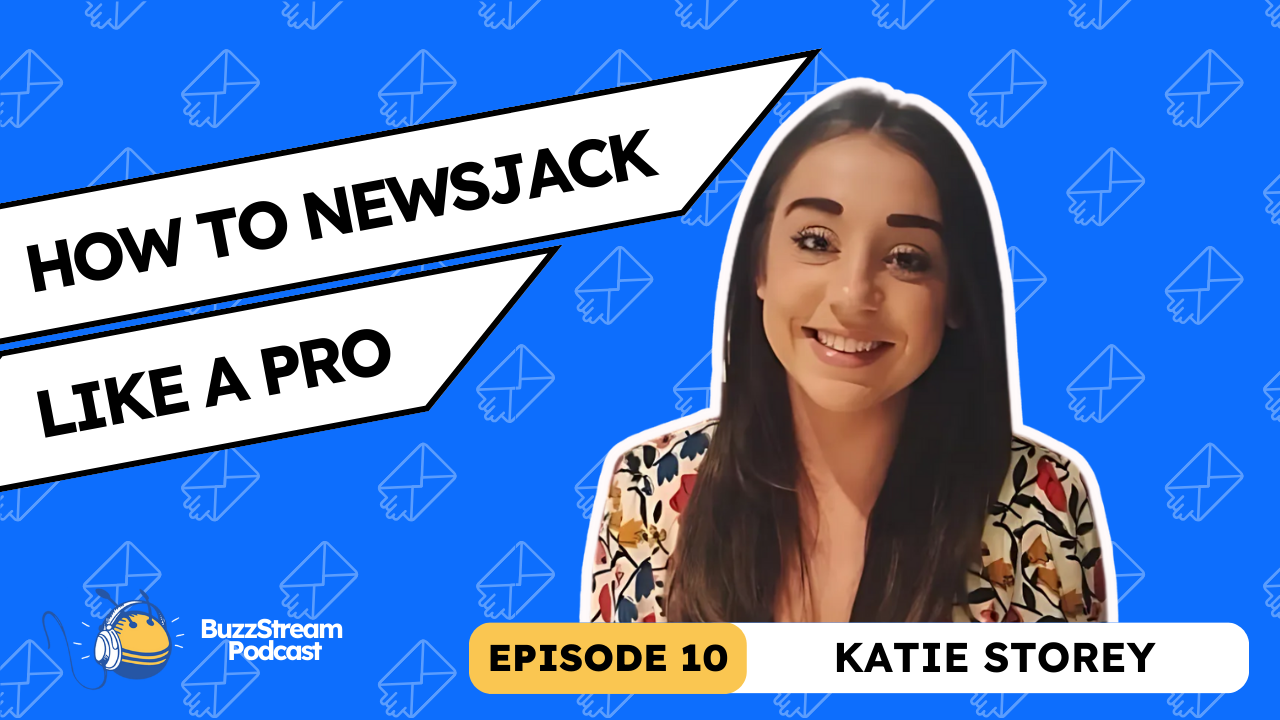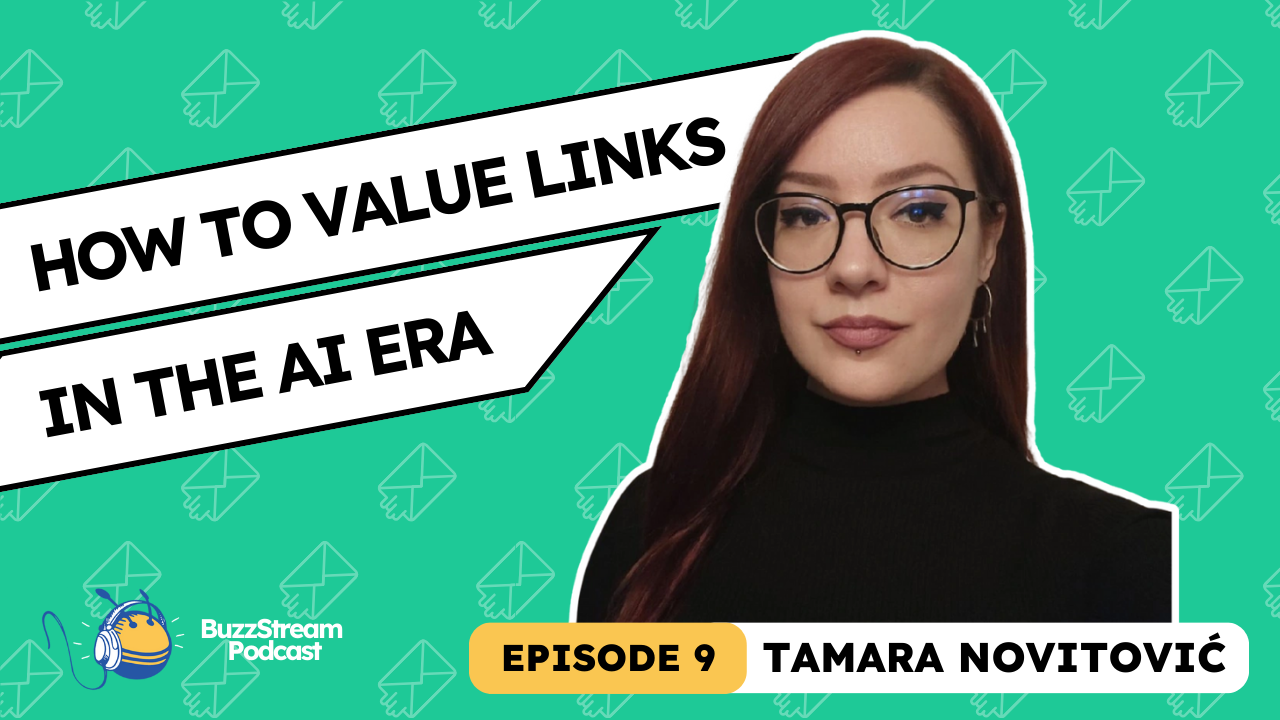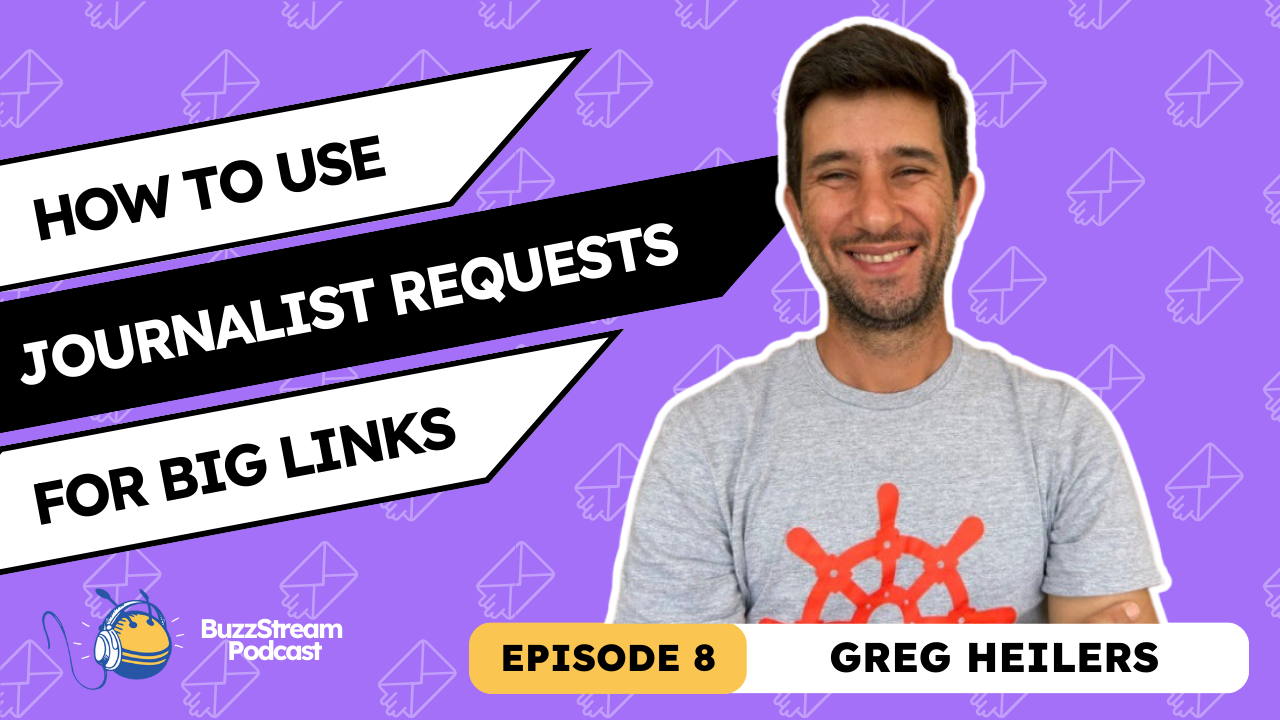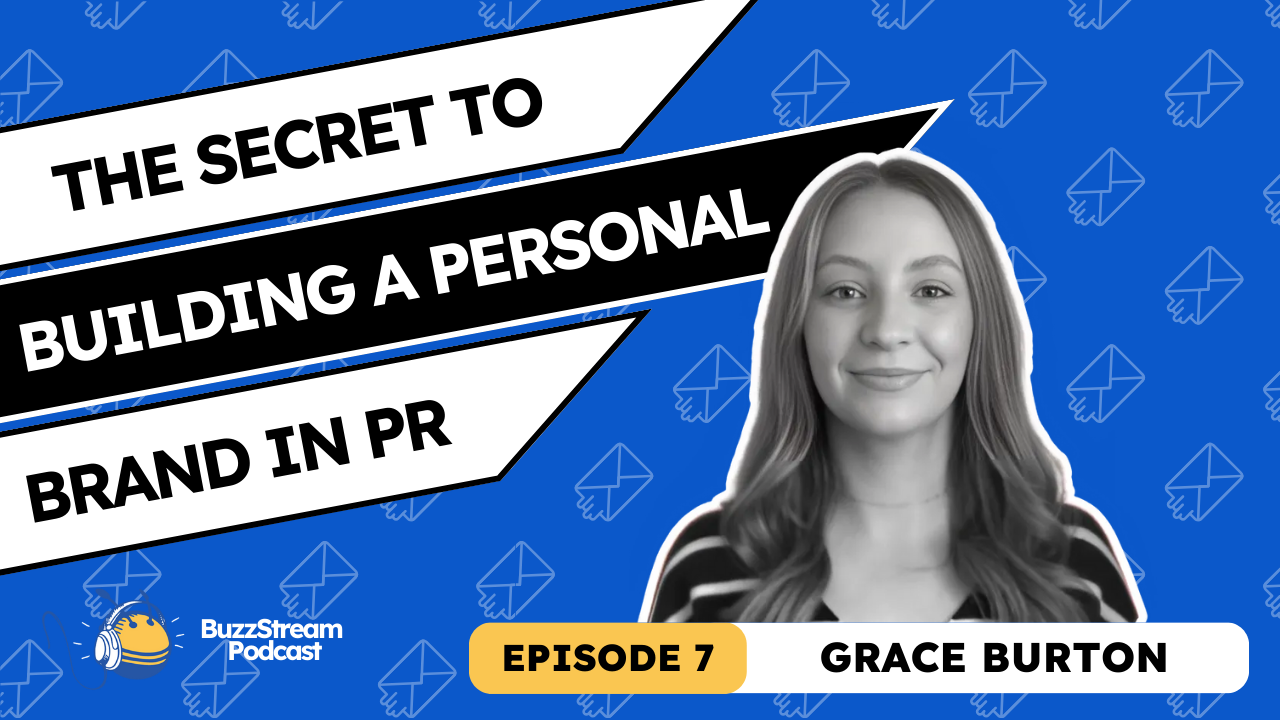Table of Contents
Before I was at BuzzStream, I worked with The Grit Group, a fantastic digital marketing agency run by Alex Johnson.
I recently saw Alex publish a fantastic LinkedIn post about why every SEO should study branding. (It’s a great read—check it out here.)
Given all of Google’s wild things, like AI Overviews, Site Reputation Abuse, Helpful Content Updates, and ChatGPT’s emergence, his post resonated with me, so I asked him to come on the pod to discuss it.
The days of spinning up a site just to make some money are virtually over. Big brands are winning. So, SEOs need to think differently about how we build and work with brands. Instead of working in a silo, we need to work together to build brand awareness outside of just Google.
Digital PR and PR, in general, are huge parts of this because they can help build brands with significant coverage and exposure.
We discuss all of this and more in this episode.
It’s an excellent conversation for SEOs, digital PRs, and agency leaders.

Below is a slightly edited transcript:
Vince: Alex posted something on his LinkedIn recently, it was about how important branding is in SEO. And you had actually published an article like this last year, around the same time, and it didn’t really get much buzz, but this one really stood out to me because it came right after.
The Helpful Content Update, the Google Leak AI overviews, this, crazy time that we’re going through and SEO, you must feel pretty validated now that, you get to see some of this stuff come true, but let’s start here and walk you through the last couple of months and how your views have changed or Maintained over the past year, given the helpful content update to Google leak and how they’ve shaped kind of your thoughts on SEO, digital PR, branding, and this whole like coalescence of branding and SEO.
How have your views on SEO and branding changed over the past year?
Alex: I think, I came up in SEO in my career, I’ve worked at Red Ventures in the early days of RV got really entrenched into the digital marketing and SEO world.
And, learned all the tips and tricks and such early on. And, but before that, to be honest, my, my love for marketing is much more on the like brand and advertising side. I love watching commercials. My team knows that, I’ll always have a Superbowl, a Slack channel, after that to circulate commercials.
And so brands always just been something that I love. And I love thinking about, why people do the things that they do. And. Why consumers operate a certain way and how brands interact with them. And I love movies and story and, just all of that. And so selfishly, I just wrote that because I like talking about like brand and I, I didn’t care if anyone had, I didn’t care if anyone thought about it the same way, or I knew most SEOs.
Kind of stay away from that word. And frankly, it’s not just SEO is it’s anyone you start to bring up brand identity or brand building or brand awareness and what is a brand. And it’s no matter who you are, an SEO, a Google ad specialist, or frankly, if you’re even working at a creative ad agency, like it just comes with a stigma and a kind of a, an aspect of it that not everybody knows what to think about brands in the first place, why do you think that is?
I don’t profess to know the answer to that question. But, thinking about like some of the questions that, we were thinking about talking through in this today. I’m like, I got myself onto a path of, I would say maybe a way to answer that is that. Whether we like it or not, as humans, we generally take the path of least resistance.
And I, I think that brand is a path of a lot of resistance. Whenever you get into trying to define something so fully, you get a lot of opinions and thoughts and perspectives and a lot of times it’s hard to get something, quantitative about that and to really say, yeah, that’s it.
And so I think that sometimes people just avoid talking about the brand because it’s so squishy and difficult to define that I think it becomes like a path of a lot of resistance, and people would rather say,
Hey, I don’t really want to get into that. Someone else figured it out and then just tell me what to do or, how to go be effective within it.
And so I’m sure there’s a lot of more thoughtful folks out there that have, dug into that question more and more, but for me, I think just like path of least resistance is something that’s been top of mind of, and I think that’s incredibly relevant to what’s going on today in the landscape of Google and generative AI.
And in all the news that’s come out this year, one of the big themes for me is just that especially for SEOs.
Like the path of least resistance isn’t going to work anymore.
And yeah, there might be some, a few cases here and there where niche SEO sites are being built and still being successful.
Um, but I would venture to say that we’re well on the path to, if you’re not building a true brand that has a legitimate reason to exist then just because you found some good affiliate deals and some high EPC categories with low competition that you can build an affiliate site in.
It’s just not going to cut it anymore.
And the same was true, 10 years ago at Red Ventures, we had sites that were tier one assets that we knew would live for hundreds of years or, hopefully in perpetuity. And we had sites that you knew we’re going to, maybe have a shorter life expectancy.
And I think Google’s just raising the bar in terms of, where the cutoff is on yeah, this is an asset that’s only going to live for a little while, unless it just takes a different approach and, I think part of that approach definitely starts to hint on, brand building like we’re talking about.
Can you give a quick background on RedVentures?
Alex: Yeah. And we also have a lot of, UK listeners and listeners from around the world. And I’m wondering, everybody might not know Red Ventures, so it might be good to give a little background because I think that helps shape some of what I know, about the internet. Yeah, if you want to just give a quick little rundown of what they are and maybe what you learned from them.
Yeah, for sure. Yeah, it’s hard to deny that like Red Ventures has influenced a lot of the culture and a lot of the. Especially the strategic thought and perspective on how to approach digital marketing that, that I deploy and that my team deploys through the group today, but, Red Ventures 10 to 15 years ago was, you could really think of them as a customer acquisition, augmentative source for direct TV, AT& T, Verizon, huge telcos, they were in the, they were in all kinds of industries.
And. It would sign these deals that basically said, Hey, we’ll build our own SEO sites. We’ll run our own PPC properties and you pay us a bounty for customers that we send you, we’ll take on all the costs of. Building and marketing those sites to generate leads. And Red Ventures was incredible at SEO and PPC to drive low cost calls and lead forms into the call center.
And then, RV had a call center itself that was pretty efficient and effective and, and did really well.
For the last, eight years to 10 years, Red Ventures has morphed One of the biggest media companies in the world. So now if you look at any top 10 list of, companies that have aggregated the widest and deepest audience online Red Ventures is up there with, Ziff Davis, Meredith, Condé Nast, they just, so you can look at, Healthline.com, PointsGuy, all kinds of, huge properties that they, that then they now own and operate.
So they’ve shifted to, this kind of media game, but really what made Red Ventures different was just the tenacity and the data perspective that they often, the speed that they operated at.
And that was a really fun thing for me to learn early in my career: to go fast, to test fast, to learn fast, to break things, to build them back, to try new things.
And that’s something I’m always thankful for. Early on in my career, it was just like having a lot of autonomy and a lot of sites to work on.
Try different things. But yeah, that’s a little bit about Red Ventures. If you haven’t heard about it before, it’s still a very cool place. They’ve been in the news recently for some miscellaneous things, really, which I think might be interesting to touch on later around a couple of their properties.
But yeah, overall, it’s a really great place that has trained a lot of some of the best SEOs in the world.
Vince: Yeah. And I remember we worked with Red Ventures, not with you directly, Alex. When I was at Siege Media, we did link-building and digital PR assets with some of those brands.
That’s how I first heard about them. Fast-forward six years, and I was going to visit the Grit Group where you guys are located in North Carolina. I remember seeing the Red Ventures campus from the plane and being like, whoa, this thing’s way bigger than I thought it was.
Alex: It is. Yeah, I think the article that came out a couple years ago was like the sleeping giant that you never knew of. It was a cool New York Times article.
Vince: So yeah, that’s a little background with Red Ventures, and I think to me helps connect those dots between the kind of this approach of turnkey SEO kind of where it was, like you said, you purchase a site that had some lights to it, some idea, and you can get affiliate money going.
I even remember Siege having a couple of these types of sites. First, Amazon started cutting its affiliate percentage. And now, that’s been going on for a few years, and it’s just that Google is not giving priority to these types of sites.
It seems like they’re really focusing on the bigger ones.
So again, that kind of ties into this idea of building a brand.
Let’s explore that a bit more and consider where people can start when discussing branding. As you said, there’s a lot to it, right? There are many different parts.
How did you learn about it? Give me tips, blog posts, podcasts, books.
How should people start learning about branding?
Alex: Gosh, I’ve written about a few things and evidently I’ve got some passion about that one. I’ve got a, I’ve got an article on like my favorite. My five favorite marketing books, which has a lot to do with brand and such, but, I think I don’t know, maybe a place to go with some of that is like to start getting into a few things that I feel like this year has really pulled forward in conversations.
As you said, there’s been, whether it was, AI overviews or the leak document or the core update, like what’s going on today?
Cause I think everybody’s been rightfully freaking out might be a little bit dramatic, but at least there’s a lot of conversation about it.
One of the things that I wrote down and, preparing to chat with you today, was just that I’m calling it gaming the system versus building true value or real value.
And, as I mentioned earlier, when I think about the SEO niche, I’ve always been more of an advertising and pure marketer by heart, but I just happened to learn SEO as the first tangible work skill in my early career.
And so I think when I think about it on a very pessimistic and maybe sounding negative side, I’ve been.
I’ve always viewed the SEO niche and industry as a whole as a little bit of gaming the system. How can you beat the algorithm? How can you be smarter than the app? How can you do all of those things?
And I think when you think about like consumer behavior and like what makes a brand, a brand isn’t what you say it is. A brand is what other people tell you it is in many ways.
And before the internet existed, before Google existed, brands existed and people had relationships with brands.
And I think that in a world of SEO, so often you’re thinking about how do I game the algorithm?
I think it’s the thought of building a brand. What’s hitting people in the face right now is that nobody likes the fact that Google’s saying your site’s not authoritative anymore.
And I think we turned it into such a game that we thought we had full control, that we thought, Hey, we can game a system.
We’re smarter than the algorithm, but brands have never been smarter than the consumers they serve.
Like they, they might think that they are at times and maybe you predict what your consumers are going to like in the future. I think that’s what Steve Jobs and Apple, that’s like what some, something that made them so special is they didn’t ask.
People, what products they wanted, they predicted the products that people didn’t even know they want, they were going to want in the future.
It was such a cool way to think about product development, innovation, and those things. But I think that I don’t know, something I’m finding interesting is just the entitlement that SEOs have of, “Hey, I did everything right.
I wrote the content according to EAT. I have squeaky clean link building, link profile.” All these things.
And it’s wait, “Google, who are you to turn off my site and turn off the traffic, right?”
So I think it’s just a really healthy part of that to say that consumer behavior can change dramatically overnight, and brands are always dealing with that, and we have always dealt with it.
And so I think the SEO community and the SEO world are now having to deal with a form of that.
Now, you could argue that Google has too much power and can manipulate it too much, but I don’t know. I think the right approach for SEO is to embrace the fact that things can change.
And that’s just part of the ecosystem we’ve all lived in. I’ve been personally jiving with this idea of gaming. The system needs to go away, and embracing building real value and listening to the feedback that you’re getting is just the mindset of the future for it.
And that all ties into just, you can’t get rich quick as much now as you used to be able to with SEO.
Vince: So you’re saying that with the SEO heist, that’s not going to work. Did you see that? It was, I guess, maybe six or eight months ago. It was like some guys built a whole site using AI content.
Then he tanked after Google found it, basically.
Alex: Yeah, I, hey, look, I’m always going to love the guys that are out there and gals that are out there building, the heist site that just, test something crazy and new.
It’s hard for me not to resonate with that. Like Ian Howells, who’s been a part of our team, for the last stretch.
I worked with him back in the Red Ventures days.
We always tested crazy stuff that was maybe a little bit gray in terms of whether it was right or wrong, but I love that about SEOs and digital marketers as a whole. I don’t know, but I love that.
Unfortunately, I think that those are going to be less and less successful going forward.
Vince: Yeah, I think it’s like, in the short term, what is your goal? To make a handful of money in the short term or to grow something meaningful? Because I think if we have this conversation with a lot of people online that you see doing this kind of stuff, they might roll their eyes at this.
It’s I don’t care. It’s keep thinking that way. And I’m going to keep getting rich. I’ve had people say that to me. I remember on Reddit, I commented on some, it was like the link building thread and somebody was talking about. Buying links and using whatever link other persons link profiles.
And it was like this super manipulative thing. And I was like, God, like I just commented, I was like, guys, I don’t think this is going to work or have. A long shelf life like this plan Google will sniff that out pretty quickly. And he was like, the person responded, yeah, you keep thinking that way.
And then while the rest of us are getting rich and it was just like, one of those, okay, like I probably shouldn’t even chime in here, but if you do want to build something meaningful, you got to really invest in it and invest time and best thought and best more strategy than just the one thing.
Yeah, I totally agree.
Alex: It just hits on the human behavior part, like path of least resistance. And when you get deep into it, not to get it, turn this into a psychology podcast, I think yeah, everybody’s motivated by different things. And if making a quick dollar and there’s lots of ways to do that and be scrappy and generate income, I think I’ve always been someone that views work.
And I think something that about being a business owner has helped cultivate this perspective for me is just that I think that the purpose of work is a lot deeper than—generating income and wealth and financial security.
I think that’s necessary for our community to survive and thrive, but there’s just a lot bigger meaning to it.
And I think that when you, not to like bifurcate, people in that way, but, Like I said, I just think that the path of least resistance that requires the least thought often is like, is pursued. And yeah, it’s Hey, I can get rich quick. It’s okay is that good? Is that the way we want everybody to think?
Did you win by getting rich quick? Or did I learn more by going through the grind to build something for the longer term? And again, Maybe no right or wrong on that, but I just, I guess I’ve just been overwhelmed with that, that feeling of, yeah, the path of least resistance. Is that always the best path?
And not to say that getting rich quick is easy and that everybody can do it. I don’t want to imply that.
I just, I think that we’re just at this point in the SEO market, but just frankly, in how content and commerce online is happening overall. I think part of this is what Google doing, what Google is doing and what’s making it more difficult to surface results that serve your clients or the brands that you’re representing or building.
The other side of it is what is AI going to do to how people discover products and services going forward?
And I think that disruption is going to be fascinating to watch. And so when I think about AI overviews. To me, like there’s been all kinds of conversation about, what is this going to do?
Am I going to lose 40 percent of my organic traffic overnight?
What’s this going to do to my business if I’m heavily, SEO dependent?
We’ve seen that the rollouts rolled out and rolled back. But what that’s really led me to is just saying, how are consumers going to shop for products differently going forward?
So, I’ve been really enjoying listening to various podcasts about that. When I say that websites aren’t going to exist in 10 years, people are like, what does that world look like?
And we’re busy talking about how the heck do we make sure we maintain our rankings on Google and generate that traffic?
I’m like shoot, like, what if that’s not even a source of traffic in audience going forward?
And it sounds weird to say on a micro scale and then say Google anti trust, but for some reason the world of AI, I don’t know what that’s going to look like.
And so if websites don’t exist, that feels bigger than Google getting ruled against being the default browser on phones.
But, even that is we’ve historically always looked at Google from an SEO perspective is, it’s the monster, the only thing that matters.
Yeah, sure. You get 5 percent of your traffic from Bing or Yahoo, but, there’s just so much shakeup in terms of, where our audience is even going to be available going forward.
And I think it’s just, it’s exciting to think about. And when I think about even just thinking about like BuzzStream and like digital PR and PR as a whole, and I’m really bullish on like PR in general being incredibly important going forward.
I think that maybe it got, I think PR, I’m not saying digital PR. I’m just saying PR in general.
I think PR, in general, has become a more top-of-funnel, less conversion-oriented channel.
And I would say in the, if you’re, if you grew up in the digital marketing, funnel era, you probably don’t think very highly of PR as a practice.
In the same way that PRs don’t think very highly of SEO as a practice.
That’s right. Man, I think PR, and I love it. But link building has evolved, and I think most chatter that I’m hearing and some of the perspectives we have are that digital PR is link building at this point.
And, I think that digital PR, the best digital PR people I’m talking to right now, seem to have this perspective of, Hey, my, my career progression is not to then become an SEO.
My career progression is to then become a leader of communications and PR more broadly. And I think that’s a cool perspective.
Vince: You mentioned a couple of things that I want to touch on. So one of them was. The thing that I didn’t mention at the beginning of this, the fourth factor, that goes into all this Google upheaval is that we’re recording this August 14th.
It was Monday, a few days ago, maybe last week.
Yeah, Google was deemed a monopoly by the Supreme Court, and so I have this conversation a lot when we talk about relevancy with different people. I had James Brockbank on this podcast, who talked about this idea.
He’s not the first person to say it, and you hear it a lot: If Google wasn’t around, what’s your content with your links matter, right?
You can extrapolate that all the way out, right? If Google wasn’t around to your point, how would customers find you? If Google wasn’t around, how would your brand exist? And that’s just Go getting into that branding.
Let’s talk a little bit about branding and PR overlap because I think there’s probably a lot there that people don’t really recognize.
When I was first getting into this, I read a book by Ryan Holiday.
He was the youngest CMO, and he just happened to be the CMO for American Apparel. He also did stuff like branding, which they call guerrilla marketing and growth hacking.
These are all the buzz terms that got me really interested in it, and it was more than just, here is my lane, and I’m going to stick into it.
I only do PR. It was like thinking of the brand as a whole. It just so happened to be a tactic that maybe leaned heavily into PR. He was reaching out to journalists to promote some type of negative ad that he had put out himself about something just to drum up some interest and drum up some conversation about the brand.
To push this brand in a certain way, this, he also did work for Tucker Max, I don’t know if you remember Tucker Max it’s a divisive guy, but like he, he had his brand, which was like, it’s just this kind of jerk guy.
And so the marketing lends itself to that kind of, I don’t know, upside-down branding and PR.
So yeah, I think to your point, like there is a lot of that just overlaps. And I, but I’m not exactly sure where that is.
Can you talk about the overlap between branding and PR?
Alex: Yeah. Brands. So maybe an interesting perspective that I could have led off with this more but, when I worked at Red Ventures, we were doing SEO.
For some of the biggest brands in the world, DirecTV, right? I think when I was there, DirecTV had 2. 3 million searches a month for their brand name. It was just some huge number. And so what I realized when I left Red Ventures is that, we were, they were phenomenal at what they did, but it was really a harvesting game.
They were simply harvesting demand that the brands had created over time.
And when I realized that small brands that don’t have 3 million monthly search views or searches for their brand, and you’re talking about non-brands as where you’re trying to generate volume, and it’s Holy smokes.
This is a whole different game. It’s way more challenging. And so when you talk about the value of brand.
Even from an SEO, pure SEO perspective, like the bigger the brand, the more there is to harvest and it’s just, anyway.
Vince: And you’re saying Alex, just to put a real life example of that.
From my perspective, I want to make sure I understand this. Like you worked with DirecTV and they had sites like DirecTV deals, DirecTV coupons or whatever.
So those sites were leaning off of the brand value and how people might search for DirecTV and search for DirecTV deals. So they inserted themselves in that.
Alex: Yeah, that’s right conversation.
Yeah, just think about like page one of the SERP.
It’s just valuable real estate. You know that the bigger the brand, the more valuable that real estate is, and more people can benefit from it.
And so, as opposed to letting their competitors creep up and having Dish Net, Satellite Network, and whatever other satellite TVs were available, right?
Like sneak in there, the additional properties that RV brand helped protect the branded serves.
And there was just so much volume for it that even if the click-through rate falls below the one, like the two, three, four, five, all 3 million searches a month still has a decent amount of traffic compared to that point.
But yeah that’s what I was implying, but I think to your example of the breadth of a CMO and like touching on a lot of different disciplines.
One of the things that I wrote in that article around branding was this: I made this up myself, so someone else has probably done this better than me before, but I’ve started to think about my dad really challenged me on this because I always told him, I was like, man, like, we just bring really great strategy to the table is like one of our differentiators at Grit, like we’re really great at strategy.
He’s what do you mean strategy?
It made me think more deeply about that. He gave me this book called The 22 Immutable Laws of Marketing, which is an old-school short read. I think it’s Al Reese.
I recommend it to anybody in any marketing field. My takeaway was that I’m calling it three levels of strategy.
So I got like channel-level strategy.
So, what is my SEO strategy? What are the levers that I have within SEO to derive different strategies?
I can say, Hey, I have a content led strategy.
I’ve got a digital PR led strategy.
I’ve got a technical SEO led strategy. That’s your channel level.
Then I’ve got like what I call operations level, which is, do you understand your funnel?
Do you understand how valuable a customer is to you?
Do you understand the parameters of which you’re, how much you’re willing to spend to acquire a customer?
That’s where, to me, the operations level is: Do you know your funnel? Do you know your economics? Can you apply it to the different channels?
And then I call it leadership-level strategy:
Can you connect your actions to the mission and vision of the company?
And so to me, the more generalists, the CMOs, and those folks are able to do that, right?
The really good ones can connect all activities back to the mission and vision of the company, which hopefully has their consumers and all their stakeholders in mind.
And so when you think about the brand, I think that’s, for an SEO person or a digital PR person or PR in general, the more you can understand leadership level strategy and what that is, to me, what unlocks.
Like real strategy in terms of like real SEO strategy. And so that’s, I write about, I wrote about that in a little in the article, like if you want to come up with a really great PR or digital PR campaign, if you don’t truly understand the mission and the vision of the company, you don’t truly understand your customers.
You don’t like, I know these can sound like basic things, but I think they’re also just missed a lot is that.
How are you going to come up with a great piece of content?
Yeah, sure. You might be able to like reverse engineer, where did one of your competitors get a ton of links or sure. You can, figure out, you know, what topic has a ton of search volume that you think you have enough domain authority to rank for.
But I think ultimately being able to connect your actions back to the mission and the vision and the leadership level strategy of a company.
That’s to me, what if every junior first, second year SEO spent time, like understanding and learning that not only does it like unlock better strategy, like a better content plan, a better digital PR plan, I think it also just unlocks your ability to go.
Advocate for and get those things approved internally, because you can position it with an understanding of what’s actually valuable to the company.
And, I can’t tell you how many SEOs I’ve seen come out with an amazing plan, for X, Y, or Z, and then just really fail at selling the idea.
And it’s easy to especially in your first few years of your career to just get dejected by. Um, I have different ideas of what to do and am getting shot down.
But I think yeah, anyways, I love those for folks who Grit, like one of the DNA that we’re always looking to recruit for is just folks that want to get shot down and put our will into just really say, “Hey, like I’m going to get back in the arena and figure out and really take that extreme ownership to say.”
It was my decision to believe that this idea deserved to live if I really believed in it and if I knew how and why to sell it.
Ultimately, if it is a great idea, then get it across.
A lot of times, I think you might find out that you have an amazing idea, but it’s narrow-minded to your niche.
And if it doesn’t align to the direction of the company and the mission and the vision as a whole.
That’s probably why the idea is not getting any traction. So I don’t know. There are a couple of thoughts, like unlocking true SEO strategy by understanding what your brand really stands for and why it exists and then selling your ideas, strategies, and tactics by communicating to your boss or your boss’s boss in a way that resonates and kind of connects up the chain.
Vince: Yeah. I feel like in a lot of agencies, it’s easy for, especially new people, a lot of them, at least when I was at the Siege, like when we first started growing, it was like, where do we get new, eager employees?
And it’s usually fresh out of college, fresh out of university, you’re getting people who have the skills, and they’re willing to get into it, but I think what can sometimes happen is that sometimes you hit that 1st roadblock, right?
You come in with a lot of ideas, and they don’t necessarily fit the agency model.
So you have to reconfigure your ideas at the model, and they get diluted. And then the next thing, you’re just going along with the motions, right? You’re learning and you’re growing, but you’re doing it in a different way than all of that motivation that you brought into it.
So it can be hard to say, think outside the box or even in other cases, you are put on a client and you don’t have the time or you’re not given. All of the information needed to understand the brand. So when you go to brainstorm, you’re thinking in a very narrow bucket.
You’ve been given this client. Oh, it’s a running shoe. So we could talk about running, we can talk about whatever. And you weren’t told that they also recycle all their shoes or some big key brand element that could be interesting and help build a brand and get these ideas sold.
How do you cultivate that type of agency workflow or whatever you want to call it so that you give your team members that drive while also ensuring they have the information to build the brand and that the goal is to build the brand as a whole so that that doesn’t get lost?
Alex: Yeah. And that’s a that’s a question from someone who spent time in an agency.
Vince: I thought, I think you do, did a great job at that when I was there.
You’re great leader and you really push the idea of leadership and being a leader and, to give a shortcut to the answer or, what I’m getting at is I think a lot of it comes from the agency head.
I was always impressed by the fact that you enabled the people who work there to think for themselves and bring solutions. You touch on something about feeling like if the problem fails, it’s on you, but if it does well, it’s on you.
It’s also on you where I think just maybe a new person, a junior employee doesn’t necessarily connect that connect the dots.
They’re like, feel the I don’t want to call it pressure feel the impact. I should say that what they do. And I thought you did a good job of that. I don’t know.
How do you cultivate an agency full of people willing to push a brand forward (not just worry about KPIs)?
Alex: You don’t have to prompt me much to get talking about. What you prompted initially just revolved around connecting the work that you’re doing to its purpose, particularly in a client environment. And so I appreciate the kind words. I think leadership has become a passion of mine within the business, but it’s really developed.
Kind of just this accidental entrepreneur that I became and realizing, I think, just the gravity of what it is to lead people and how stinking hard it is. I write a lot on LinkedIn about miscellaneous leadership, but I think many leaders get a bad rap.
And it’s been to me, I feel like a couple of years within the last couple of years, there’s been multiple kinds of tech layoffs or this or that, where there are big cutbacks. And then you see, you just see all this chatter on LinkedIn about how horrible these companies are, how poorly they were led or how, and don’t get me wrong, like leaders are making mistakes and I’m sure there’s places that maybe have bad culture, but I would just say that like more often than not, I think there’s a lot of really great leaders out there.
And I think what happens is just. Unless you’ve sat in the seat you’ve built and owned a business, you’ve led people at that level, man it’s thinking hard.
And the reality is that business is imperfect and leaders are imperfect. And. It’s never going to change like that’s how that’s how humans were designed.
And, I think that so I think leaders need, I think they need to be held very responsible to being excellent at their job.
But I also think there needs to be from a broader conversation perspective. I think it’s just swung a little bit more towards. Leaders are out for themselves and, not thinking about others and disconnected from their employees.
And there’s a lot of good leaders out there. And I just think that narrative is maybe a little too aggressive.
That tangent aside, your question around from an agency perspective for clients, I think it is, I’ll give you a great example that hopefully answers that question to some level, which is today I spent a good portion of my day.
Like rethinking our mission and vision.
What’s happened for me is that I’ve really loved it for the last couple of years.
But over the last couple of months, I’ve decided that my passion and the way I would describe it is shifting. And so I’m at this point where I’m like, dang if I’m going to authentically lead, then I need to adjust what some of these statements say.
So we can then build our operations and how we work in alignment with that. And the realization I had today, the meeting that I’m going to have after this, is with one of my key people to say, Hey, I’ve got a huge roadblock in my head because I’m not personally attached to our mission and vision in the same way that I was two months ago.
And if I’m not, then everybody else on the team will feel that.
And we’re just going to wander around and do a lot of work, which won’t matter much. And so when you start to get into an agency world like that, you’re starting. Oftentimes, you’re working with someone who’s a VP of marketing, head of SEO, or head of digital.
And there are lots of people that are phenomenal leaders that are in those positions, but they’re also generally a couple of layers removed from the leader who had the vision and the mission.
So if we’re going to do our work as a service provider, With a mission mindset of how does the work that we do connect to the mission of this client’s brand You’ve got to figure out how to dig that out of your point of contact or help them Make sure that they’re connected to it.
There’s so much work that needs to be done, but I think, yeah, gosh, I would encourage any other agency owner out there. You know, I’m always hopeful, and I’m pushing my team on this: We have to dig deeper to understand the why behind the work that we’re doing, and the more closely you can understand that, the better.
And, so the main point of contact, whoever’s working with that client, like you gotta be a great detective and know the questions to ask to, to really pull that out because there’s the practical, Hey, this work that we’re doing needs to generate a 20%. Increase in traffic, but then there’s the soft part of, yeah, this we’re doing this because it helps fund an eco-friendly system that, all of these shoe sales go to the fund, 1 percent for the planet or something.
And there’s a deeper piece there. And so you get a lot stickier when you’re aligned to the mission and the vision, man, it can become quick in an agency.
And it’s not just an agency. It’s any setting where work just becomes work. It becomes a task list that you’re just trying to accomplish, even if you’re trying to do it to the best of your ability.
I think motivation and inspiration wane, especially when you get disconnected from, why you’re doing it.
I think the onus on within an agency setting of if you’re an account leader or account director, your main point of contact and you’re distributing work to the rest of your team just finding a way to continually come back and say, all right we’re doing this work because we’re trying to serve this client by helping them generate an incremental 20 percent traffic.
We know that’s going to yield a million dollars for them. And that million dollars is going to create job security for my main point of contact.
Maybe it creates upward mobility for them. Maybe they have two kids and they’re growing family. They’re trying to figure out, do I rent or do I buy a home next year?
And and so these are the ways that you can really deeply connect, like the work that you’re doing to say, “Hey we served this client that we served the people that were there and we served the mission, that organization in a really meaningful way.”
And so anyways, I could ramble about that for a while as that’s become my segue here of Hey, I could keep talking, but I should and pause.
But hopefully that kind of answers some of your question a little bit.
Vince: Yeah. And pulling back all the way to the beginning or conversation and This all kind of loops into this idea of I don’t call it. The connection isn’t as firm there to I’m not saying that’s taking a shortcut, right?
Not knowing enough about the client is taking a shortcut, but it is right? Like, when your work is not tied into the brand itself. It’s going to hurt all the other, the arms of the company. So yeah, I think one of the things that also stood out to me when I was with grid and I think this kind of ties into this as well was you were really good at telling stories in reporting, and with relationships with clients and like how your relationship with a client has been going. And you could probably even take that a step further saying that is probably a good way to also read. Constantly reinforce your agency’s connection to the overall brand, right? Like the story is that we’ve been pushing, SEO improvements and your team isn’t implementing them, but we really think that they’re going to impact, your brand awareness and dah.
So, having this ongoing big picture in your communications with the client seems to be the way to get everybody on the same page—not just your own internal team.
How do you use storytelling to reinforce the connection to the brand?
Alex: For sure. Yeah, to the point that nobody knows what brand means, like story is a huge part of that. And so one of my, you asked about books and stuff.
One of my favorite books on that was Building a Story Brand by Donald Miller.
Basically, he’s built himself a marketing consultancy and an events-based business purely based on taking the construct of how to write a story and turning it into an actual script for a movie or a show.
And turning that into kind of a, how to do marketing recommendation.
And I would definitely say that, yes, like just studying story in general is such a good thing to do.
And it’s one of those things I’m like, why every SEO should study branding. It’s you could replace that with why every SEO should study story.
And I think the more that you understand how to tell the story and such. And there’s such a one in the same, right? Yeah, it’s really no big difference like the branding is the way to tell the story, right?
It’s a different ways.
Yeah, that’s right but yeah, I think for agencies and Yeah, finding a way to turn data, and connect it to the story find the story in the data all the all those things are Super helpful.
And I think the more, who you are as an agency, the more you can just more simply reiterate, reiterate your story which is a lot of what I’ve just alluded to, I hate to say that I’m in a period of like change or indecision is what it feels like.
I think change is probably a more positive way to say, for the last few years, our mission has been to strengthen brands by driving profitable revenue growth.
So the word strengthened meant a lot to me in writing that. And so that’s something we always tried to say, Hey, when we’re having conversations with our clients, how do we say that? “Look, Hey, Elizabeth. Hey, Jeremy. We’re here to strengthen your brand.”
So let’s make sure we’re focusing on the projects that do that the most and don’t get too attached to one thing or another, but come back to our mission.
And yeah, I’ve got a tangent on my, my refined version that I’m working on is I think one of the biggest things agencies got to pay attention to is just frankly, ego problems.
I think that like agencies tend to think that they know a whole heck of a lot more than the brands that they’re interacting with.
And I think it’s just a very tempting, place to go in your mind.
And I think I’ve always struggled with having case studies or, marketing ourselves because of that dynamic. But candidly, one of the things I’m thinking about from a positioning for Grit is like, how to, what if we positioned as the world’s most selfless marketing agency?
Because I think marketing agencies just have a pretty bad rap of being pretty selfish.
It’s Hey, we get to leverage brand a brand B and brand C to generate revenue. And frankly, if we fail yeah, you might have, maybe you have a performance based structure in place with that, but like most of the time.
If what you’re doing fails, the client’s the one that suffers, not you on that. So anyways, I just, I think agencies have a bit of an ego problem. Maybe another podcast.
Vince: Yeah. And I think to bring back one of the things that pops into my head was like a real light version of this, like when the story goes wrong, right?
Like it’s easy for us to talk about this kind of stuff. And again this is why I think when you talk Like philosophically about brand and marketing and digital marketing.
Like I said earlier, some people roll their eyes because it’s hard to make those one-to-one connections. But I can think of the top of my head so many times when a brand has gotten negative press.
Like I challenged, people who are listening and watching, go to Ahrefs, pop that brand, like the website into, into Ahrefs and look at the site traffic, a lot of times you’ll see rankings dip.
I think Google pays attention as much as they don’t say that they do, I think do pay attention to negative press and in the same way, positive press.
And you might go viral for something and that can really help.
But on the flip side, like if it’s a viral for something that’s not related to the brand itself, like it’s not really going to do much for you.
That stuff does matter. And I’ve seen it. And again I urge people to dig into that.
If you are finding yourself rolling your eyes when you’re talking about branding and story and that sort of thing man, you can make so many parallels to real hard evidence.
And, it’s not just branded keywords, right? It’s the overall trajectory of a website and momentum and everything that I can always stifle them or hopefully aided by good PR and good, story.
What are some ways to connect SEO to brand and story?
Alex: Yeah, for sure. Yeah. I think, I don’t know, one of the, a thought that comes to mind with all of that is just like the goose and the golden egg.
And I think that that’s maybe a really it’s just a simple and helpful fable to come back to in an instance like this.
I think in the SEO community in particular, the most cautionary tale now, I don’t know, I don’t, I hesitate to share about this because I respect Red Ventures so much, but the most cautionary tale that’s relevant at the moment is, they just sold CNET to Ziff Davis and like they bought CNET for 500 million and they sold it for, A little over a hundred million.
And there was a precipitous drop off in traffic over the last two years.
And if you, unless you’ve been living on a rock, you’ve probably seen some sort of chatter about CNET’s use of AI content or this or that. And I think to your point, like the sentiment online has been that CNET SEO-ified or, went heavy on the monetization.
And to me that’s they chased the golden egg.
They said, Hey, here’s this asset that we have that has a ton of audience and we can sell a lot of things to that audience. And I think on the very negative side of how you could perceive all of that, like they lost track of the brand.
There are many companies like Red Ventures out there with very experienced SEO people who are starting to have more ownership and autonomy over big media properties that have built brands.
And I think it’s just an interesting time to look at that.
And so I think to your point Sentiment matters.
And I think Google, and maybe we should pay attention to some of these other search engines as well.
They’re all getting smart enough to pick up on some of that stuff. And so I was just with my teammate Paul at Affiliate Summit East and another event in New York a couple of weeks ago, and I wasn’t there, but Paul heard the CEO of Ziff Davis speak.
And he said something that I’ve stuck with both of us, which was just that one of their measures of success for all their properties, like one of the biggest measures is how much direct entry traffic do they have? And his point was that if people are directly entering, then they’ve done something historically to satisfy that customer.
And for them to come back and I just thought that was, I’m like, man, that’s obvious, but I hadn’t thought that in the last 10 years of being digital marketing. And, I think if you want to prove that your brand has a reason to exist or that it’s adding true value, I think that yeah, I know direct entry traffic, maybe that’s the hot theme of yeah that’s, yeah.
All right. I think it’s probably a good place to wrap up here because that kind of puts a bow on this conversation and the importance of thinking about branding and building a brand as an SEO. Alex, I want to thank you so much for your time, Alex.

 End-to-end outreach workflow
End-to-end outreach workflow


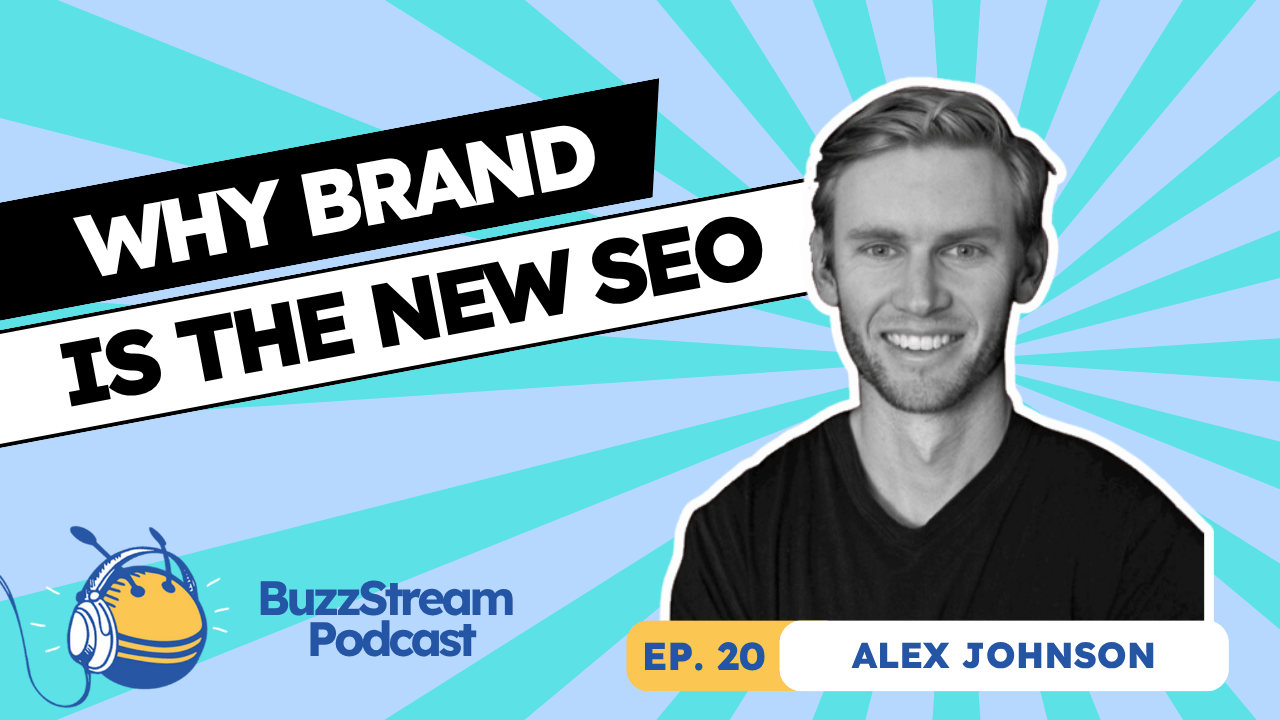
 Check out the BuzzStream Podcast
Check out the BuzzStream Podcast

